Introduction: Understanding the Importance of a Balanced Cockatiel Diet
A balanced diet is the cornerstone of your cockatiel’s overall health and happiness. Just like humans, cockatiels require a variety of nutrients to thrive. Many new bird owners often wonder, “What is the best food for cockatiels?” or “What can cockatiels eat to stay healthy?” Providing the right mix of seeds, pellets, fruits, and vegetables is essential to meet their nutritional needs.
In the wild, cockatiels enjoy a varied diet, which includes seeds, fruits, and even small insects. However, a seed-only diet in captivity can lead to malnutrition and health problems. That’s why it’s crucial to offer a mix of healthy cockatiel food options, including pellets that provide essential vitamins and minerals, as well as fresh produce.
A poor diet can lead to obesity, vitamin deficiencies, and a shorter lifespan for your feathered friend. But by understanding the nutritional needs of cockatiels, and offering them a balanced diet, you can ensure your bird stays active, happy, and healthy for years to come.
Throughout this guide, we’ll break down what your cockatiel should be eating, how to create a cockatiel diet plan, and the foods you should avoid to ensure your bird lives its best life. Whether you’re a new cockatiel owner or just looking to improve your bird’s nutrition, this guide will give you all the tips you need.
What Do Cockatiels Eat in the Wild?
In their natural habitat, cockatiels are opportunistic feeders. They enjoy a diverse diet that keeps them healthy and active. Unlike their counterparts in captivity, wild cockatiels don’t rely solely on seeds; instead, they forage for a variety of food sources.
In the wild, cockatiels primarily eat a mix of seeds, grains, and grasses. During certain seasons, they’ll also snack on fruits, berries, and even small insects. This variety in their diet ensures they get the nutrients they need to maintain optimal health. Foraging for food is a big part of their lifestyle, and it helps keep them mentally stimulated as well.
Seeds are a major part of a cockatiel’s diet in the wild, but they are balanced out by the occasional fruit or vegetable they might come across. Wild cockatiels also consume grasses and green shoots, which provide fiber and essential nutrients. The occasional insect offers a source of protein, helping round out their nutritional intake.
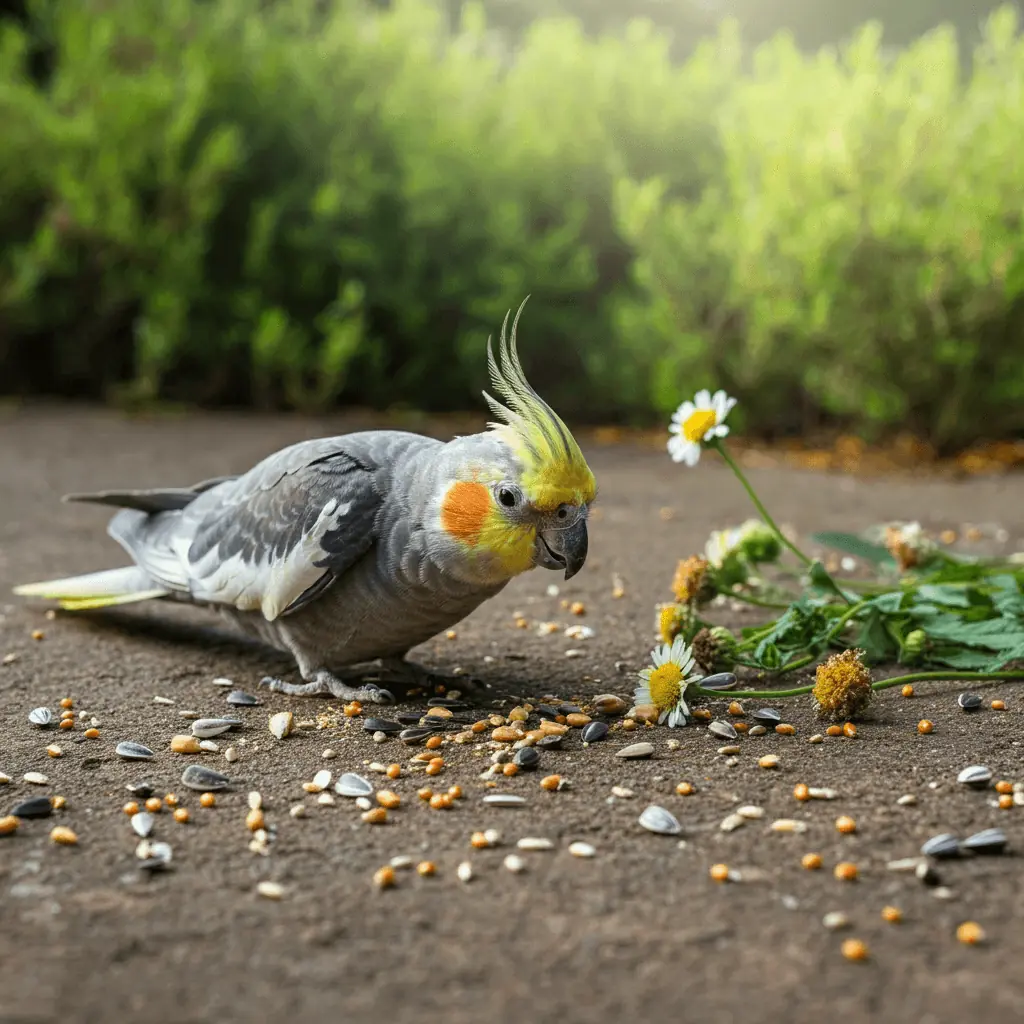
A cockatiel actively forages in the wild, picking at seeds and small plants.
Understanding what cockatiels eat in the wild gives us a clearer picture of what they should be eating in captivity. While seeds are a significant part of their diet, they should be supplemented with fruits, vegetables, and high-quality pellets to mimic the variety they experience in nature. Providing a similar mix of food at home will help keep your cockatiel healthy and satisfied.
This variety ensures they get the right balance of nutrients, which is key to maintaining their health. A diverse diet that includes more than just seeds is important for their long-term well-being, both in the wild and in your home.
The Essential Components of a Healthy Cockatiel Diet
To keep your cockatiel healthy and thriving, it’s crucial to offer a well-balanced diet that meets all of their nutritional needs. While seeds are often the go-to food for many bird owners, a healthy cockatiel diet should include a variety of food types to ensure proper nutrition.
Here are the essential components of a balanced cockatiel diet:
1. Seeds
Seeds are a staple in a cockatiel’s diet, but they should not be the only component. A diet made up entirely of seeds lacks important vitamins and minerals, which can lead to deficiencies and health issues. While seeds can provide fat and energy, it’s best to offer them in moderation and as part of a broader diet.
2. Pellets
Pellets are specially formulated to give cockatiels a complete and balanced meal. High-quality pellets contain the essential vitamins, minerals, and nutrients your cockatiel needs, making them a perfect daily food option. Unlike seeds, which can be high in fat, pellets offer a more controlled balance of nutrients, ensuring your bird gets everything it needs without overloading on fats.
3. Fruits and Vegetables
Fresh fruits and vegetables are a must for a healthy cockatiel diet. Cockatiels love variety, and adding fruits like apples, pears, and berries or vegetables like spinach, carrots, and peas can provide them with essential vitamins and fiber. These fresh foods offer a nutritional boost that helps balance out the diet, giving your bird a more well-rounded intake of nutrients.
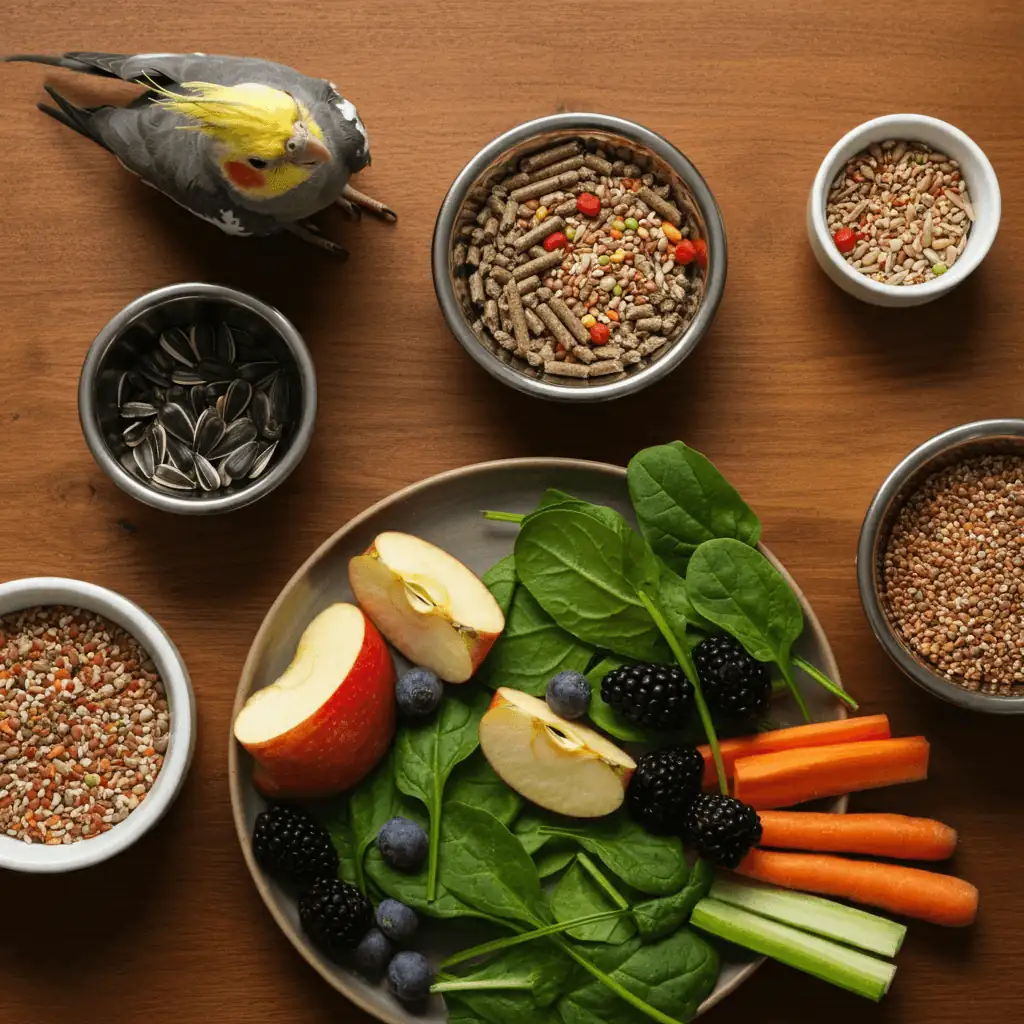
A balanced diet for cockatiels featuring pellets, seeds, and fresh produce.
4. Proteins
While cockatiels don’t require a lot of protein, including small amounts can be beneficial. You can offer boiled eggs or small amounts of cooked chicken as an occasional treat. Some owners also provide mealworms or other small insects, which mimic what wild cockatiels might eat.
5. Calcium and Supplements
Cockatiels need calcium for strong bones and egg-laying (in females). Calcium supplements, like cuttlebones or mineral blocks, are an easy way to ensure your cockatiel gets enough calcium in its diet. Offering these alongside their regular meals is a great way to support their overall health.
By providing a diet that includes seeds, pellets, fruits, vegetables, and occasional proteins, you’re giving your cockatiel the variety and nutrition it needs to live a long, healthy life. A balanced diet isn’t just about meeting their nutritional needs—it’s also key to keeping them active, happy, and engaged.
Offering this variety ensures your bird stays healthy and satisfied, and you’ll be promoting the optimal health of your feathered friend.
Seeds vs. Pellets: What’s Better for Your Cockatiel?
When it comes to feeding your cockatiel, many bird owners ask the same question: should I feed my cockatiel seeds or pellets? While seeds have been a traditional food source, pellets are becoming increasingly popular due to their balanced nutrition. Understanding the pros and cons of each will help you make the best choice for your bird’s health.
Seeds: A Natural but Incomplete Option
Seeds are a natural part of a cockatiel’s diet, especially in the wild. They’re high in fats and provide a good source of energy. However, when fed exclusively in captivity, seeds can lead to an unbalanced diet. Cockatiels love seeds, but too much can result in nutrient deficiencies, as seeds lack essential vitamins and minerals like calcium, vitamin A, and iodine. Additionally, a high-fat diet from seeds can cause obesity and other health problems in the long run.
While seeds can still be a part of your cockatiel’s diet, it’s important to offer them in moderation and mix them with other healthier food options.
Pellets: A Balanced, Nutrient-Rich Choice
Pellets, on the other hand, are specifically designed to provide a balanced diet for cockatiels. They contain all the essential nutrients your bird needs—vitamins, minerals, proteins—packed into each bite. Unlike seeds, pellets are low in fat and ensure your cockatiel gets the nutrition it needs without the risk of overconsuming fats.
Pellets are often recommended by avian vets because they promote a healthier lifestyle and help prevent common diet-related illnesses. By feeding your cockatiel high-quality pellets, you’ll provide a more complete, balanced diet without the nutritional gaps that seed-based diets can leave.
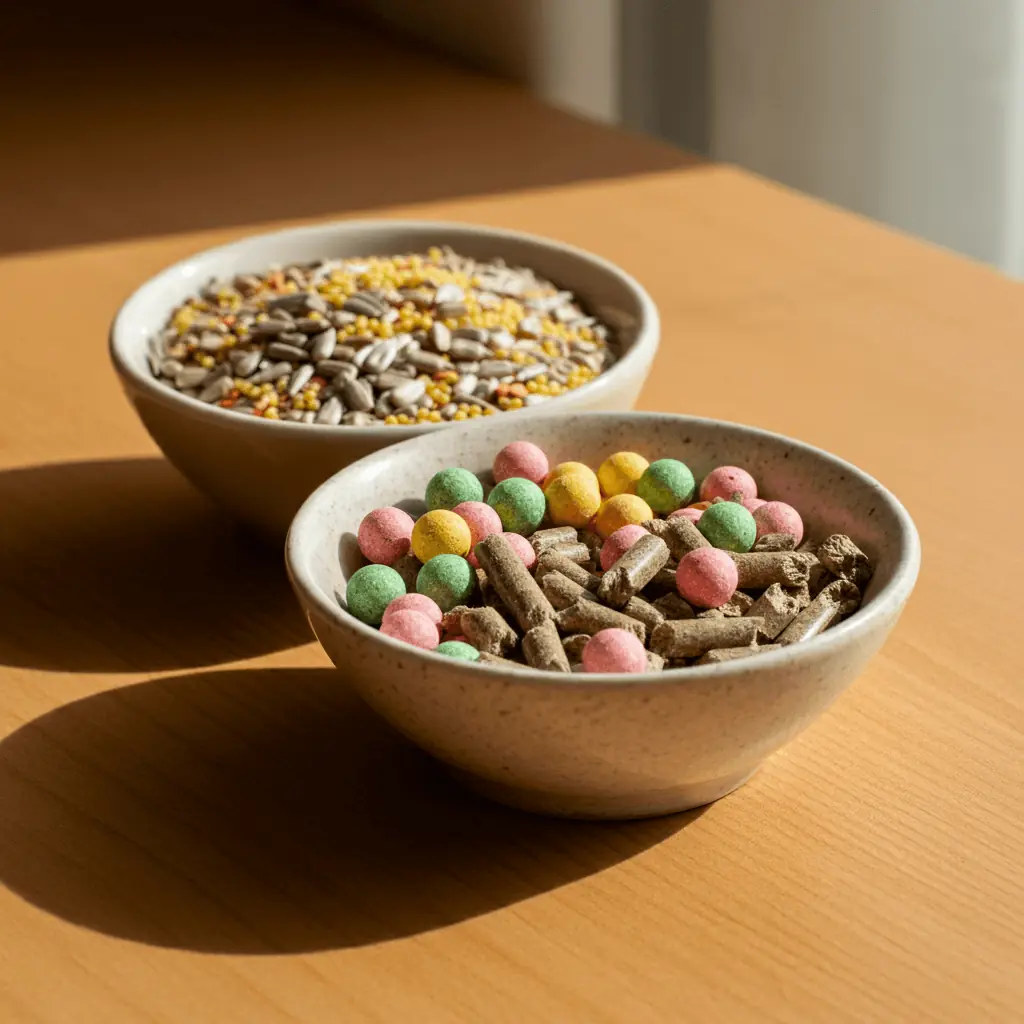
Side-by-side comparison of seeds and pellets for cockatiels to highlight dietary options.
What’s Better for Your Cockatiel?
The best approach is a balanced mix of both seeds and pellets. While pellets should make up the bulk of your cockatiel’s diet, a small portion of seeds can still be offered as a treat or to add variety. This way, your cockatiel can enjoy the flavors and textures of seeds without missing out on the vital nutrition pellets provide.
A diet that combines pellets, seeds, fruits, and vegetables is the ideal way to meet your cockatiel’s dietary needs. This variety mimics what cockatiels would naturally eat in the wild and helps keep them both healthy and happy.
In conclusion, pellets offer superior nutrition and should be a staple in your cockatiel’s diet, while seeds can be given occasionally to provide balance and variety.
Fruits and Vegetables: A Nutritional Boost for Cockatiels
Fruits and vegetables are a crucial part of a healthy cockatiel diet. While seeds and pellets provide essential nutrients, fresh produce gives your cockatiel the vitamins and minerals it needs for a balanced diet. These foods also add variety and excitement to their daily meals, keeping them engaged and healthy.
Fruits: A Sweet and Healthy Treat
Fruits like apples, pears, berries, and bananas are not only tasty but packed with essential vitamins like vitamin C and antioxidants that help support your cockatiel’s immune system. Fresh fruit can be offered daily, but it’s important to give it in moderation due to its natural sugar content. Small slices or chunks are perfect for your bird to nibble on throughout the day.
Avoid fruits like avocado, which are toxic to birds, and always remove seeds or pits, as they can be harmful. Offering a variety of fruits ensures your cockatiel gets a range of nutrients, and it also makes feeding time more enjoyable for them.
Vegetables: Packed with Vitamins and Fiber
Vegetables should be a staple in your cockatiel’s daily diet. Leafy greens like spinach, kale, and romaine lettuce provide essential vitamins like A, K, and iron, which help maintain your bird’s overall health. Other vegetables, such as carrots, peas, and bell peppers, are great sources of fiber, which aids digestion and keeps your cockatiel’s digestive system in top shape.
Cockatiels usually enjoy crunchy vegetables, so you can try offering raw slices or lightly steaming them to make them easier to eat. Mixing a variety of vegetables into their food bowl keeps things interesting and ensures they’re getting the right balance of nutrients.
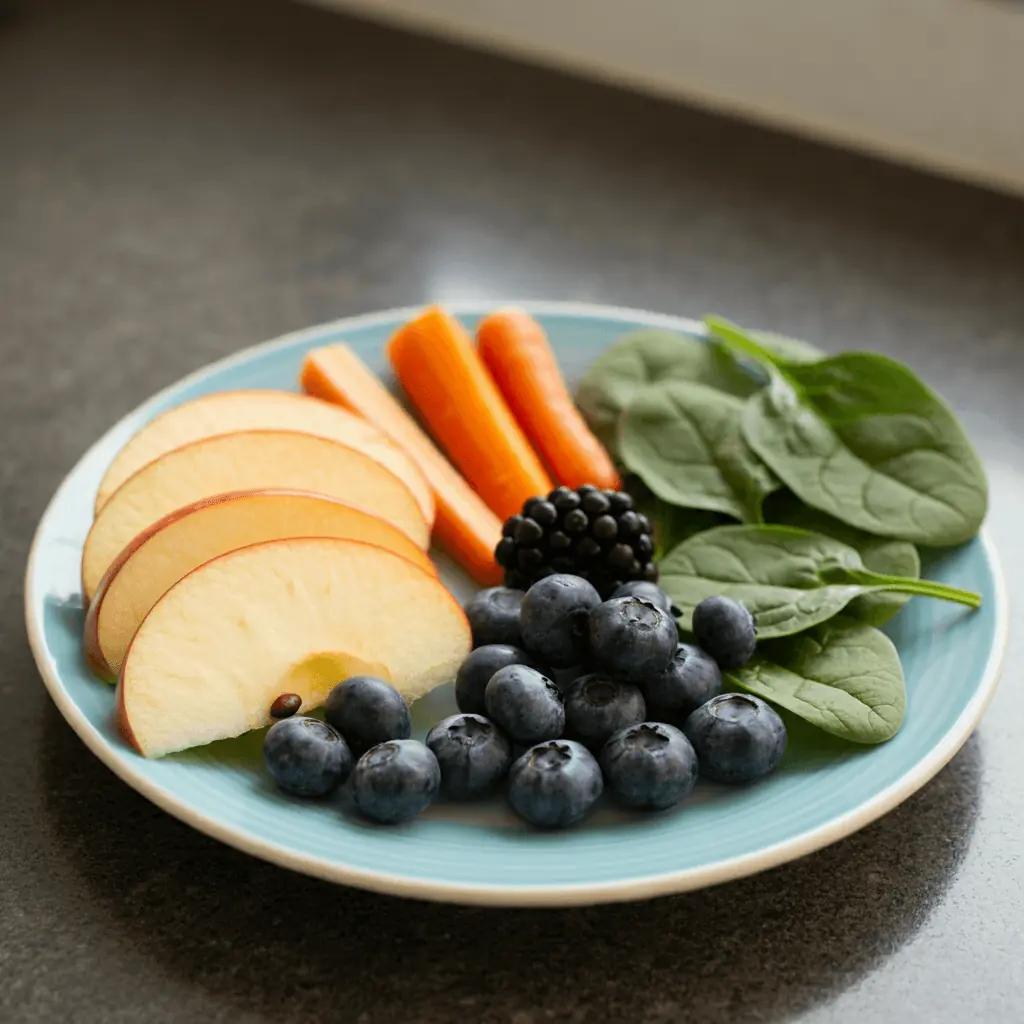
A healthy spread of fresh fruits and vegetables suitable for cockatiels.
The Right Balance of Fruits and Vegetables
When feeding fruits and vegetables, aim for around 20-25% of your cockatiel’s overall diet. The rest should consist of pellets and seeds for a well-rounded nutritional intake. A diverse range of produce not only keeps your bird’s diet balanced but also stimulates their curiosity with new flavors and textures.
Incorporating fresh fruits and vegetables into your cockatiel’s diet is a great way to support their long-term health. By offering these natural, nutrient-rich foods, you’re giving your bird the best chance to stay vibrant and full of energy.
Remember, fresh produce should be cleaned thoroughly to remove any pesticides or chemicals before feeding. With the right combination of fruits, vegetables, and other foods, you can ensure your cockatiel thrives!
Proteins and Treats: What to Include and Avoid
While cockatiels don’t require a large amount of protein in their diet, including the right sources of protein can benefit their overall health. Similarly, offering treats in moderation can be a great way to bond with your bird, but it’s important to choose healthy options and avoid harmful ones. Understanding what proteins and treats to include—and which to avoid—ensures your cockatiel enjoys a balanced and nutritious diet.
Proteins: Essential but Minimal
In the wild, cockatiels occasionally consume insects for a boost of protein, but in captivity, you can provide alternative sources. Boiled eggs are an excellent source of lean protein and can be offered occasionally. Just chop a small portion into manageable pieces for your cockatiel to enjoy. You can also offer small amounts of cooked chicken as a rare treat, though this isn’t necessary for their daily diet.
If you prefer a vegetarian option, some owners offer protein-rich foods like cooked quinoa or legumes (like lentils or chickpeas), but these should only be served in small portions.
Safe Treats: Fun and Nutritious Options
Treats are a great way to reward your cockatiel and add variety to their diet, but not all treats are created equal. Healthy treat options include small pieces of fruits like apples, berries, or vegetables like carrots and bell peppers. Cockatiels love exploring new flavors, and these natural treats offer both enjoyment and nutritional benefits.
Millet spray is a popular treat that cockatiels adore. However, since it’s high in fat, millet should be given in moderation, reserved for special occasions, training, or bonding sessions.
Foraging toys stuffed with healthy snacks are another great way to provide treats while keeping your bird mentally stimulated.
What to Avoid
While some treats are safe and nutritious, others can be harmful or lack nutritional value. Avoid sugary or processed treats like crackers, chips, or any human food that contains salt, sugar, or artificial additives. Avocado, chocolate, and caffeine are toxic to cockatiels and should never be part of their diet.
It’s also important to avoid giving your bird too many seeds as treats, as they’re already a common part of their diet. Excess seeds can lead to obesity and nutritional imbalances.
Protein and treats can be included in your cockatiel’s diet, but they should be given in moderation. Stick to healthy, natural options like boiled eggs, fruits, and vegetables, and avoid high-fat or processed foods. By carefully selecting what you include and avoid, you can ensure your cockatiel stays happy, healthy, and well-nourished.
Water and Hydration: Keeping Your Cockatiel Healthy
Just as with any pet, ensuring your cockatiel stays hydrated is vital for its overall health and well-being. Clean, fresh water should always be available to your bird, as proper hydration supports digestion, regulates body temperature, and keeps your cockatiel’s feathers in good condition.
How Much Water Does a Cockatiel Need?
Cockatiels don’t consume large amounts of water compared to some other birds, but they need a steady supply throughout the day. On average, a cockatiel will drink a few teaspoons of water daily, but this can vary depending on their diet. If your bird eats more dry food, such as seeds, they may require more water, whereas a diet rich in fruits and vegetables provides additional hydration.
The Importance of Clean, Fresh Water
Keeping your cockatiel’s water clean is crucial. Water can quickly become contaminated with food particles, droppings, or dust, which can encourage bacterial growth and potentially make your bird sick. It’s important to change the water daily—or even more frequently if it gets dirty. Always ensure the water dish is thoroughly cleaned and free from debris.
Water Source: Tap vs. Filtered Water
While many cockatiel owners offer tap water, it’s essential to ensure it’s safe for your bird. If your tap water contains high levels of chlorine or other chemicals, consider using filtered water instead. Water quality can vary by region, so providing clean, safe drinking water is a simple yet effective way to protect your bird’s health.
Signs of Dehydration in Cockatiels
Dehydration can happen if a cockatiel isn’t drinking enough water or if their water source is contaminated. Some signs of dehydration include sunken eyes, dry or flaky skin, or reduced activity. If you notice any of these symptoms, consult an avian vet immediately and make sure your bird has access to fresh water at all times.
Other Ways to Keep Your Cockatiel Hydrated
In addition to providing water, you can help keep your cockatiel hydrated by offering water-rich fruits and vegetables. Foods like cucumbers, apples, and melons have a high water content, which can support hydration naturally. Cockatiels also love bathing, so offering a shallow dish of water for bathing not only keeps their feathers in good shape but can also encourage drinking.
Water is a key part of your cockatiel’s overall health. By ensuring they always have access to clean, fresh water and incorporating water-rich foods into their diet, you can keep your cockatiel hydrated and healthy. Proper hydration supports digestion, feather quality, and overall well-being, making it an essential aspect of their care.
What Foods Should Be Avoided for Cockatiels?
While a healthy cockatiel diet includes seeds, pellets, fruits, and vegetables, there are certain foods that should never be part of your bird’s diet. Some foods that may seem harmless to us can be toxic or unhealthy for cockatiels, leading to serious health issues. Knowing what foods to avoid is just as important as understanding what to include in your cockatiel’s diet.
1. Avocado
Avocado is highly toxic to cockatiels and should never be offered in any form. The fruit contains a compound called persin, which can cause heart damage, breathing problems, and even death in birds. Avoid feeding your cockatiel anything that contains avocado, including guacamole.
2. Chocolate
Chocolate may be a delicious treat for humans, but it’s dangerous for birds. Even small amounts of chocolate can cause vomiting, diarrhea, seizures, and heart problems in cockatiels. Always keep chocolate and any chocolate-containing foods out of your bird’s reach.
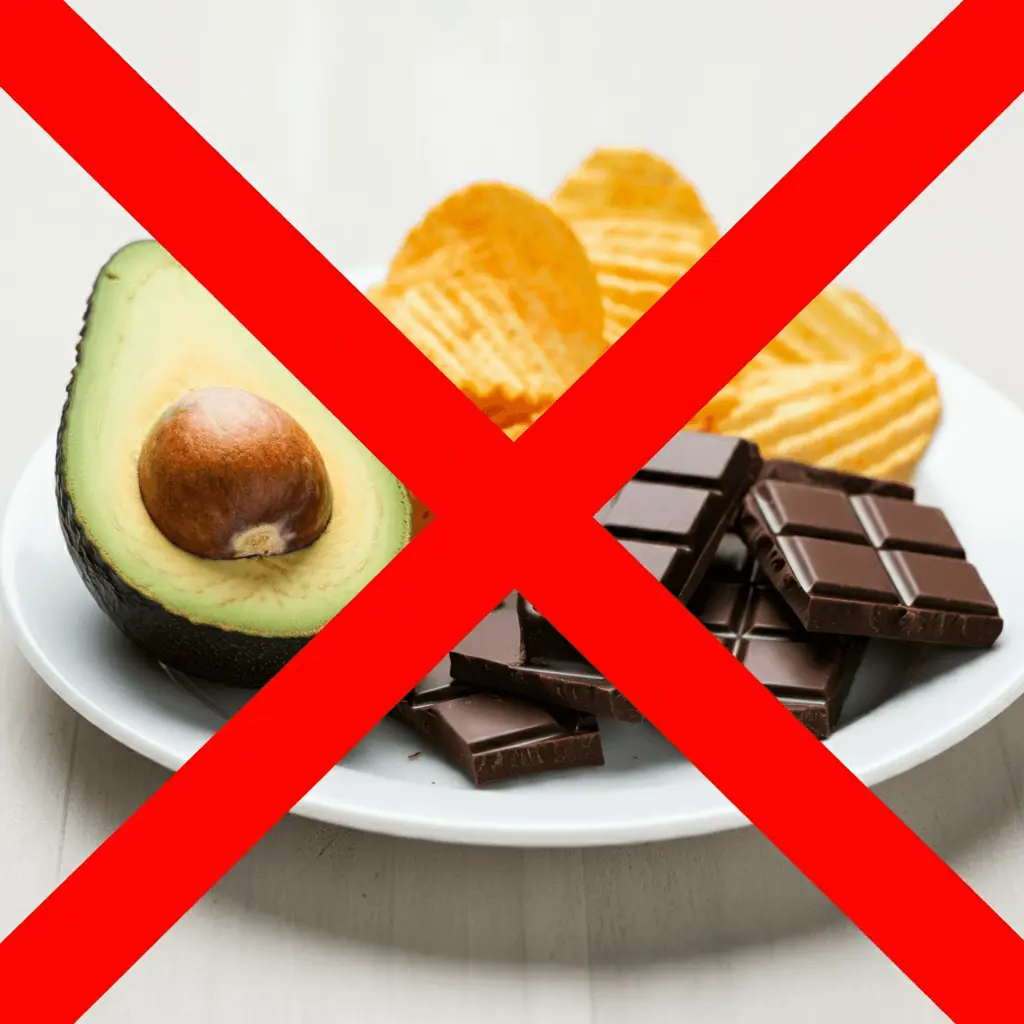
Warning against salty snacks, avocado and chocolate, which are toxic to cockatiels.
3. Caffeine
Caffeinated beverages like coffee, tea, and soda are a big no for cockatiels. Caffeine can cause increased heart rate, hyperactivity, and even cardiac arrest in birds. Make sure to keep your bird away from any drinks that contain caffeine, and never let them sip from your cup.
4. Alcohol
Alcohol is extremely harmful to birds and can lead to serious health issues such as liver failure and death. Even a small amount can be toxic, so it’s essential to ensure that your cockatiel never comes into contact with any form of alcohol.
5. Salty or Sugary Foods
Cockatiels have a much lower tolerance for salt and sugar than humans. Salty snacks like chips or pretzels can disrupt their electrolyte balance, leading to dehydration and kidney problems. Similarly, sugary foods can cause obesity and lead to liver and heart issues. It’s best to keep salty and sugary treats out of your cockatiel’s diet.
6. Onions and Garlic
Onions and garlic are toxic to cockatiels and can cause digestive irritation, anemia, or even death. This includes any form of onion or garlic—raw, cooked, or powdered. Be sure to avoid giving your cockatiel any food that may contain these ingredients.
7. Dairy Products
While small amounts of dairy may not cause immediate harm, cockatiels lack the enzymes to properly digest lactose, the sugar found in dairy products. Too much dairy can lead to digestive upset and diarrhea, so it’s best to avoid offering milk, cheese, or yogurt to your bird.
8. Pits and Seeds from Fruits
Some fruit pits and seeds contain cyanide-like compounds that are toxic to cockatiels. While fruits like apples are safe to eat, the seeds should be removed before offering them to your bird. The pits from cherries, peaches, and plums are particularly dangerous and should be avoided entirely.
Knowing what foods to avoid is key to keeping your cockatiel healthy and safe. Foods like avocado, chocolate, caffeine, and alcohol can be toxic, while others like salty or sugary snacks, dairy, and certain fruit seeds can cause digestive or long-term health problems. By steering clear of these harmful foods, you’ll ensure your cockatiel thrives on a balanced, healthy diet.
How to Create a Feeding Schedule for Your Cockatiel
Creating a consistent feeding schedule for your cockatiel is key to maintaining its health and ensuring it gets the right nutrients at the right times. Cockatiels thrive on routine, so having a regular feeding plan not only keeps them healthy but also reduces stress.
Step 1: Establish Regular Meal Times
Cockatiels are most active during the morning and early evening, making these the best times to feed them. You can start by offering fresh food—such as pellets, fruits, and vegetables—in the morning. This gives your cockatiel the energy needed for the day. In the evening, offer a lighter meal or top up any remaining food.
Sticking to a consistent routine helps your bird anticipate meal times, reducing the likelihood of overeating or wasting food.
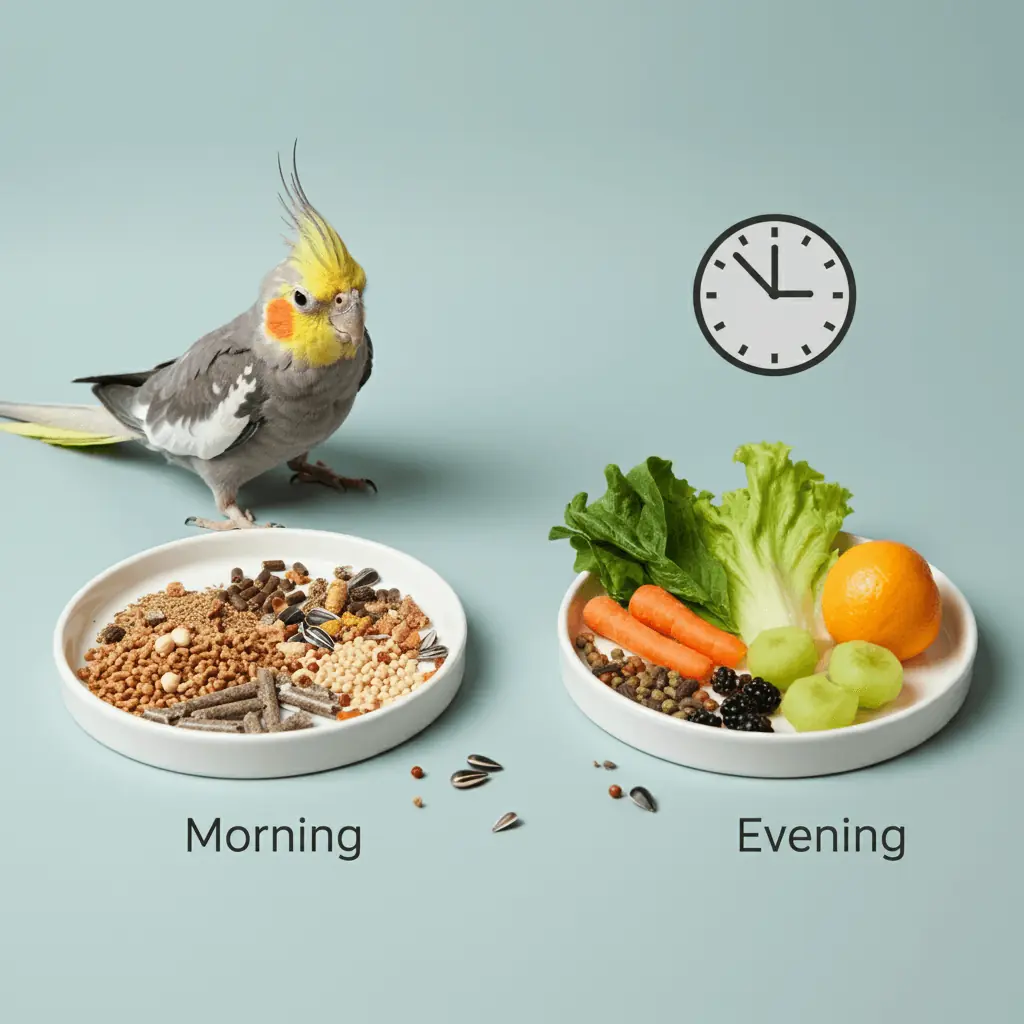
Illustration of a balanced daily feeding schedule for a cockatiel.
Step 2: Balance Seeds and Pellets
While seeds are often seen as a favorite, they shouldn’t be the main component of your cockatiel’s diet. Pellets should form the bulk of their meals, as they offer balanced nutrition. Offer a measured portion of pellets each morning and allow your cockatiel to graze throughout the day.
Seeds can be given as part of the evening meal or as a treat after your cockatiel has eaten its pellets and other healthy foods. This ensures they are not over-relying on seeds for their diet.
Step 3: Include Fresh Fruits and Vegetables Daily
Fruits and vegetables are a vital part of a healthy cockatiel diet. Each morning, alongside pellets, offer small portions of fresh produce such as apples, carrots, spinach, or berries. Remove any uneaten fruits and vegetables by evening to prevent spoilage.
Fresh food is best served in the morning when cockatiels are hungriest, allowing them to get the most nutritional benefit.
Step 4: Monitor Water Intake
Alongside food, make sure fresh water is always available. Change the water at least once a day, preferably in the morning, to ensure it’s clean and free from food particles. Dehydration can lead to serious health problems, so keeping water fresh and accessible is crucial.
Step 5: Provide Treats in Moderation
Treats can be a fun way to reward your cockatiel, but they should be given in moderation. Popular treats like millet spray or bits of fruit can be offered during training sessions or bonding time. Avoid giving treats too often or in large quantities, as they can disrupt your cockatiel’s balanced diet.
Step 6: Adjust the Schedule Based on Your Bird’s Needs
Each cockatiel is unique, and you may need to adjust the feeding schedule based on their age, activity level, or preferences. Younger birds may require more frequent feedings, while older birds may be content with two main meals a day. Always observe how your cockatiel responds to its feeding schedule and make changes if needed.
A regular feeding schedule helps ensure your cockatiel receives the nutrition it needs to stay healthy. By feeding a balanced mix of pellets, seeds, and fresh produce at consistent times each day, you’ll promote better eating habits and a happier, healthier bird. Routine is important, so stick to set meal times and always provide fresh water to keep your cockatiel in peak condition.
Frequently Asked Questions (FAQs)
1. What is the best diet for a cockatiel?
The best diet for a cockatiel includes a balance of high-quality pellets, seeds, and fresh fruits and vegetables. Pellets should form the majority of their diet, as they provide complete nutrition. Seeds can be given in moderation, along with a variety of fresh produce like apples, spinach, and carrots to offer essential vitamins and minerals.
2. Can cockatiels eat fruit every day?
Yes, cockatiels can eat fruit every day, but it should be given in moderation. Fruits like apples, berries, and pears are excellent choices, but avoid fruits with high sugar content and always remove any seeds or pits, which can be harmful to your bird.
3. Are seeds bad for cockatiels?
Seeds aren’t bad for cockatiels, but a seed-only diet can lead to health problems. Seeds are high in fat and lack many essential nutrients. It’s important to offer seeds as part of a varied diet that includes pellets, fruits, and vegetables for balanced nutrition.
4. How often should I feed my cockatiel?
It’s best to feed your cockatiel twice a day—once in the morning and again in the evening. You can offer pellets and fresh fruits and vegetables in the morning, and seeds as a small part of the evening meal. Fresh water should always be available.
5. What foods should cockatiels avoid?
Cockatiels should avoid toxic foods like avocado, chocolate, caffeine, and alcohol. Salty or sugary human snacks, onions, garlic, and dairy products should also be kept out of their diet, as these can lead to serious health issues.
6. Can cockatiels eat eggs?
Yes, cockatiels can eat boiled eggs occasionally as a source of protein. Just make sure the egg is cooked thoroughly and offer it in small, bite-sized pieces. It should only be given as a treat and not a regular part of their daily diet.
7. What are the signs of a healthy cockatiel diet?
A healthy cockatiel diet will result in bright, shiny feathers, clear eyes, and an active, energetic bird. Your cockatiel should maintain a healthy weight and show interest in a variety of foods. Regular droppings that aren’t too watery or too dry also indicate a balanced diet.
8. How do I introduce new foods to my cockatiel?
Introduce new foods slowly by offering small pieces alongside familiar foods. Cockatiels can be picky, so it may take time for them to try new fruits or vegetables. Be patient and consistent, and eventually, they may accept the new additions to their diet.
By understanding the basics of what makes up a healthy cockatiel diet, including what foods to offer and avoid, you can keep your bird happy and thriving. Following a regular feeding schedule and being mindful of their nutritional needs will ensure a long and healthy life for your cockatiel.
Conclusion: Ensuring Optimal Health Through Proper Nutrition
Providing your cockatiel with the right nutrition is one of the most important aspects of keeping them healthy and happy. A balanced cockatiel diet—rich in pellets, fresh fruits, vegetables, and a controlled amount of seeds—ensures that your bird gets all the essential nutrients it needs for a long, vibrant life.
By understanding what cockatiels eat in the wild and how their diet translates to captivity, you can create a feeding routine that promotes optimal health. Offering a variety of food not only meets their nutritional needs but also keeps them mentally stimulated and engaged. Avoiding harmful foods like avocado, chocolate, and sugary snacks is equally important in maintaining their well-being.
At the core of it all, proper nutrition supports everything from your cockatiel’s energy levels to their feather quality. Stick to a feeding schedule that includes a mix of pellets, seeds, and fresh produce, and always provide clean water to keep your bird hydrated. With the right care and diet, your cockatiel will thrive and bring joy to your life for many years to come.
In short, ensuring your cockatiel’s optimal health through proper nutrition is simple: offer variety, avoid harmful foods, and prioritize balance in their daily meals. By doing so, you’ll be giving your feathered friend the best chance to lead a healthy, happy life.

